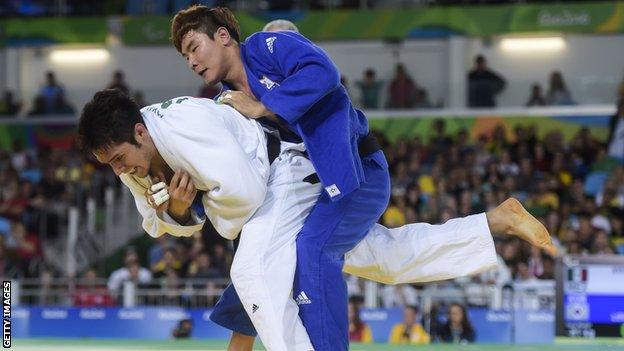Judo at Tokyo Paralympics: All you need to know
- Published

Mexico's Eduardo Avila Sanchez and Korea's Lee Jung-min will renew rivalries in Tokyo
Paralympic Games on the BBC |
|---|
Venue: Tokyo, Japan Dates: 24 August-5 September Time in Tokyo: BST +8 |
Coverage: Follow on Radio 5 Live and on the BBC Sport website |
Key information
Dates: 27-29 August
Venue: Nippon Budokan
Gold medals on offer: 13
How does it work?
Judo at the Paralympics is only open to athletes with a visual impairment. The rules are the same as for Olympic judo, except that the fighters start the bout gripped up.
Each competition is based on weight divisions, with seven for men and six for women. Men's events are up to 60kg, up to 66kg, up to 73kg, up to 81kg, up to 90kg, up to 100kg and more than 100kg while women's events are up to 48kg, up to 52kg, up to 57kg, up to 63kg, up to 70kg and more than 70kg.
Athletes are classed as B1 (least vision), B2 or B3 but each weight category is open with athletes from the three classes competing against each other.
If an athlete has a red circle on their kit, it indicates that athlete has a B1 level of visual impairment. If an athlete has a yellow circle on their kit, it indicates that athlete is deaf as well as having a visual impairment.
The men's contest takes place over a maximum of five minutes, with four-minute contests for women. Scores of varying degrees are awarded for throws, holding techniques or submissions with judokas bidding for an ippon to end the contest.
However, if neither achieves an ippon, the player who has accumulated the greatest number of points, achieved through throws and holds such as a yuko and a waza-ari, by the end of the bout is declared the winner. Two waza-ari also make an ippon.
Penalties (or shidos) are also given to the athletes for a range of reasons and can ultimately lead to victory and/or disqualification. Collecting four penalties can award victory to their opponent.
If both judoka are tied on scores or penalties at the end of their contest, it goes to a 'golden score', where the first person to score wins, with no time limit.
Who are the British medal hopes?
Chris Skelley is world number one in his -100kg category and after losing out in his bronze-medal match in Rio has gone on to win European gold and bronze and world bronze. Elliot Stewart, whose father Dennis won Olympic bronze in 1988, is world and European bronze medallist and is ranked fourth in the world before his Paralympic debut.
Who are the other challengers?
Three of Uzbekistan's eight gold medals in Rio came from judo and their fighters added another silver and six bronzes to top the medal table. South Korea took three golds at the 2018 World Championships and Ukraine and Mexico are also well respected in the sport.
One of Skelley's big rivals will be Brazil's Antonio Tenorio who is the most decorated judoka in Paralympic history, with six medals (four gold, one silver and one bronze) from his six Games appearances. This is set to be his swansong.
Did you know?
Ukraine's Inna Sych won her country's only gold in the sport on her Paralympic debut in Rio in the -57kg division. But she has moved down to the -52kg category where she is world and European champion and is aiming for a second gold at a different weight.
ParalympicsGB Rio 2016 medals
None